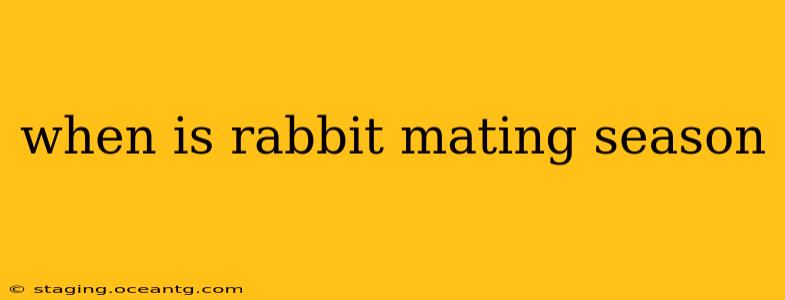Rabbits, known for their prolific breeding habits, don't adhere to a strict, calendar-based mating season like some animals. Instead, their reproductive cycle is influenced by a number of factors, making it a more nuanced topic than a simple "when" can answer. This article will explore the complexities of rabbit reproduction, answering common questions and providing a comprehensive understanding of when and how rabbits mate.
What time of year do rabbits breed?
While rabbits can breed year-round in suitable climates with ample food and resources, their breeding activity peaks during specific times. Generally, you'll see increased breeding activity in the spring and early summer, as warmer temperatures and longer daylight hours stimulate hormonal activity. However, in mild climates, breeding can continue throughout the year. This makes pinpointing a single "mating season" inaccurate.
How often do rabbits mate?
Rabbits are induced ovulators, meaning ovulation (the release of eggs from the ovaries) is triggered by the act of mating. This means that a female rabbit will only release eggs if she has recently mated. Furthermore, they are incredibly fertile, and a single female can have several litters in a year. The frequency of mating depends on several factors, including the health of the rabbit, the availability of resources, and the presence of a receptive male.
Do rabbits mate for life?
No, rabbits do not mate for life. They are not monogamous animals. After mating, the male and female rabbits typically go their separate ways, with no long-term pair bonding. The female rabbit will raise the kits (baby rabbits) on her own.
What are the signs of a rabbit in heat?
Determining when a female rabbit is receptive to mating (in "heat") can be challenging. Some signs may include increased restlessness, changes in vocalization, and a more pronounced willingness to approach males. However, these signs can be subtle, and relying on them alone isn't entirely reliable. Experienced breeders often rely on observing the interaction between the male and female rabbits to gauge receptivity.
How long is a rabbit's gestation period?
The gestation period for rabbits is relatively short, lasting approximately 30-31 days. This contributes to their high reproductive rate. After this period, the female rabbit will give birth to a litter of kits, typically ranging from 4 to 12.
How long does it take for a rabbit to become pregnant?
Pregnancy, or gestation, begins immediately after successful mating and lasts about a month. As mentioned, the act of mating itself triggers ovulation.
Conclusion: Understanding the nuances of rabbit reproduction
While there isn't a definitive "rabbit mating season," understanding the factors influencing their breeding cycle is crucial for responsible rabbit ownership. Whether you're a breeder or simply an enthusiast, knowing that their reproduction is largely opportunistic and influenced by environmental factors provides a clearer picture of these fascinating creatures. Remember, responsible rabbit ownership includes understanding their reproductive capabilities and taking steps to prevent unwanted litters through spaying and neutering.
